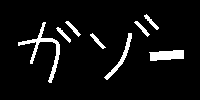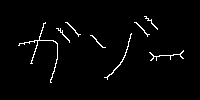将gazo.png进行细化处理吧!
细化是将线条宽度设置为1的过程,按照下面的算法进行处理:
- 从左上角开始进行光栅扫描;
- 如果x_0(x,y)=0,不处理。如果x_0(x,y)=1,满足下面三个条件时,令x_0=0:
- $$4-$$近邻像素的取值有一个以上为$$0$$;
- $$x_0$$的$$4-$$连接数为$$1$$;
- x0的8-近邻中有三个以上取值为1。
- 重复光栅扫描,直到步骤2中像素值改变次数为0。
用于细化的算法有Hilditch算法,Zhang-Suen算法,田村算法等。
python实现:
import cv2
import numpy as np
import matplotlib.pyplot as plt
# thining algorythm
def thining(img):
# get shape
H, W, C = img.shape
# prepare out image
out = np.zeros((H, W), dtype=np.int)
out[img[..., 0] > 0] = 1
count = 1
while count > 0:
count = 0
tmp = out.copy()
# each pixel ( rasta scan )
for y in range(H):
for x in range(W):
# skip black pixel
if out[y, x] < 1:
continue
# count satisfied conditions
judge = 0
## condition 1
if (tmp[y, min(x+1, W-1)] + tmp[max(y-1, 0), x] + tmp[y, max(x-1, 0)] + tmp[min(y+1, H-1), x]) < 4:
judge += 1
## condition 2
c = 0
c += (tmp[y,min(x+1, W-1)] - tmp[y, min(x+1, W-1)] * tmp[max(y-1, 0),min(x+1, W-1)] * tmp[max(y-1, 0), x])
c += (tmp[max(y-1,0), x] - tmp[max(y-1,0), x] * tmp[max(y-1, 0), max(x-1, 0)] * tmp[y, max(x-1, 0)])
c += (tmp[y, max(x-1, 0)] - tmp[y,max(x-1, 0)] * tmp[min(y+1, H-1), max(x-1, 0)] * tmp[min(y+1, H-1), x])
c += (tmp[min(y+1, H-1), x] - tmp[min(y+1, H-1), x] * tmp[min(y+1, H-1), min(x+1, W-1)] * tmp[y, min(x+1, W-1)])
if c == 1:
judge += 1
##x condition 3
if np.sum(tmp[max(y-1, 0) : min(y+2, H), max(x-1, 0) : min(x+2, W)]) >= 4:
judge += 1
# if all conditions are satisfied
if judge == 3:
out[y, x] = 0
count += 1
out = out.astype(np.uint8) * 255
return out
# Read image
img = cv2.imread("gazo.png").astype(np.float32)
# thining
out = thining(img)
# Save result
cv2.imwrite("out.png", out)
cv2.imshow("result", out)
cv2.waitKey(0)
cv2.destroyAllWindows()
输入(gazo.png):

输出:

 极客教程
极客教程